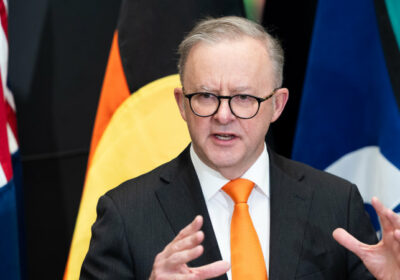PM plays down fears submarine pact could be put on back-burner

Save articles for later
Add articles to your saved list and come back to them any time.
Washington: Prime Minister Anthony Albanese has played down concerns that time is running out to pass a raft of legislation to facilitate the AUKUS submarine pact, as he embarks on a four-day blitz to lobby members of a divided Congress paralysed by Republican infighting.
Hours after landing in Washington for a highly anticipated meeting with US President Joe Biden on Wednesday, Albanese said US politicians from all sides understood the value of AUKUS and wanted “to get it right”.
Prime Minister Anthony Albanese addresses the media at a press conference in the Australian embassy during his official visit to the USA.Credit: Alex Ellinghausen
Diplomats and politicians fear that unless AUKUS progresses over the next few months, the plan could be put on the back-burner once America enters a volatile election year in which Donald Trump is attempting a return to the White House.
Multiple pieces of legislation still need to be passed to make AUKUS a reality, including laws to enable US Virginia-class submarines to be transferred to Australia; a bill that would categorise Australia as a “domestic source” for military production under the US Defence Production Act; and a $3.4 billion White House funding request to strengthen the US Navy’s industrial base amid concerns from some Republicans that AUKUS could stretch it to “breaking point”.
However, Congress – the legislative branch of the US government – has been paralysed and without a Speaker of the House of Representatives for three weeks, after top Republican Kevin McCarthy was ousted by a small group of hardline rebels within his own party.
Despite the challenges, Albanese said he was “very confident” of a positive outcome.
“And that comes from the top in President Biden’s commitment to this, but it also comes from the engagement with Congress and senators,” he said.
In a bid to garner more support for AUKUS, Albanese is expected to meet on Thursday morning with Senate and House leaders who oversee defence policy and funding to talk about the policy.
A reception will also be hosted for him by the bipartisan Friends of Australia Caucus, while the issue will be front and centre at Capitol Hill on Wednesday when Congress’ seapower and projection forces subcommittee, co-led by Democrat Joe Courtney, holds a hearing on America’s submarine industrial base and its ability to support the AUKUS framework.
Appearing at the hearing will be some of the defence industry’s top officials, including Department of Defence assistant secretary Mara Karlin, under secretary of the navy Erik Raven and Naval Submarine Forces commander Vice Admiral William Houston.
Asked if he would be willing to increase Australia’s $3 billion commitment to boost the US submarine base, Albanese replied: “We think our support is appropriate.”
But signs of the challenge in getting legislation to pass in a dysfunctional Congress were evident on Monday night. As Albanese attended a welcome reception at the north-west Washington residence of Australia’s ambassador to the US, Kevin Rudd, Republicans met behind closed doors on Capitol Hill in another frantic search to find a replacement for McCarthy.
Last week, the party nominated two potential candidates – House Majority leader Steve Scalise and Trump ally Jim Jordan – but neither was able to get the 217 votes needed from their fiercely divided colleagues.
Eight new candidates are now in the running: Republican whip Tom Emmer, Louisiana congressman Mike Johnson, Republican study committee chairman Kevin Hern, Florida firebrand Byron Donalds, Michigan congressman Jack Bergman, Gary Palmer of Alabama, Austin Scott of Georgia and Pete Sessions of Texas.
Until a new Speaker is elected, there is no one third in the line of succession to the president; no ability to pass a funding bill to avoid a government shutdown next month; and no capacity to approve Biden’s new funding request for billions of dollars to support Israel and Ukraine.
The impasse has dashed Albanese’s hopes of delivering a rare address to a joint sitting of Congress, while the Israel-Hamas war has made the state visit a more subdued affair than Scott Morrison’s 2019 visit when Trump was president.
Asked if the White House should have proceeded with the visit, spokeswoman Karine Jean-Pierre said there was “no more important time than now” for the US to demonstrate the strength of its alliance with Australia.
Cut through the noise of federal politics with news, views and expert analysis from Jacqueline Maley. Subscribers can sign up to our weekly Inside Politics newsletter here.
Most Viewed in World
From our partners
Source: Read Full Article
